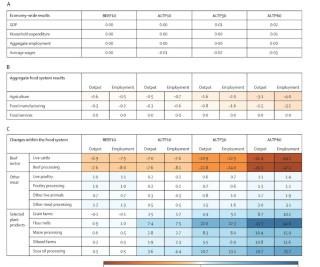By Caroline Christen
Several media outlets reported on a new study from Cornell University this month — research that looked at the consequences for wide adoption of plant-based beef alternatives across the U.S.
The stories reported alarming meat industry job losses. Yahoo News warned that beef alternatives “could cost 440,000 jobs in the UK.” The Hill reported “how plant-based beef helps climate change but hurts jobs.” The Express used the title “vegan ‘beef’ threatens 1.5 million farming jobs as woke ditch meat to save planet.”
The problem is all of these stories got the numbers wrong. What the study authors actually found is that a more plant-based food system would create more than enough jobs to offset beef industry losses. Worse, the media coverage ignored the disastrous working conditions and human rights abuses that workers face in the current meat-centered food system.
Job Losses Will Likely Be Offset
Using a national model for analysis, the study authors found that a shift to plant-based beef alternatives could reduce the number of cows raised for beef by up to 12 million animals and the carbon footprint of food production in the U.S. by as much as 13.5 percent. That’s consistent with the latest recommendations from the Intergovernmental Panel on Climate Change (IPPC), which called for a global shift to more plant-rich diets to slash emissions from food production and animal agriculture in particular. The food system contributes up to 37 percent of total greenhouse gas emissions.

The Lancet Planetary Health
The authors estimate that more than 1.5 million people employed in beef value chains in the U.S. could lose their jobs due to the shift to a more plant-based food system. However, they also expect that these job losses will be offset by growth in other sectors, including flour milling, maize processing and oilseed farming. Yet those critical offsets were left out of virtually all news reports on the research.
According to study author Mario Herrero, “there are good reasons for regulators and policymakers to encourage these up-and-coming technologies.”
Herrero also urges politicians to remain aware of unintended negative consequences and commit to supporting “disadvantaged workers and hard-hit local communities and small producers.”
A joint study by the International Labour Organization and the Inter-American Development Bank in 2020 looked at how to achieve a just transition — climate action that centers workers and frontline communities — and found that a shift to plant-based diets could result in a loss of 4.3 million jobs, but a potential gain of 19 million jobs in Latin America and the Caribbean.
Media Underreports Harms to Workers and Animals
In addition to omitting the positive effects a new food system would have on jobs, no outlet mentioned the biggest population who would be impacted by this move — animals.
The study itself did consider the potential of plant-based alternatives to reduce the total number of animals raised for meat. However, the authors only cautioned that taking beef off the menu could result in more chickens and pigs being farmed, species that are more often raised in confined feeding operations.
That the media failed to take into account how food system change would impact animals is not surprising. But outlets also failed to fully consider the impacts on the human species.
As undercover investigators, human rights organizations and psychologists have pointed out, again and again, the human costs of animal agriculture are devastating. Reporting on the future of food should include these costs along with the bare job numbers.
Most news reports also failed to mention that the shift to a more sustainable food system is absolutely necessary to prevent the climate crisis from devastating economies worldwide. The ILO and IDB study estimates that 2.5 million jobs in Latin America and the Caribbean could be lost to heat stress alone by 2030, affecting farm workers and other outdoor workers, and that damages caused by the climate crisis could cost the region $100 billion (in USD) yearly.
Click here to see more...